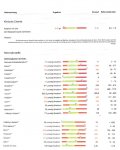***Hi, Nina.
Rich: Thanks, as always, for sharing your knowledge and time so generously. It is very much appreciated.
***You're very welcome.
I will add my thoughts to some of the points you raised below (*****):
***O.K.
If you have a partially blocked methylation cycle, and it is not restored to a normal rate of operation by this treatment (and by that I mean restoring the level of SAMe and the ratio of SAMe to SAH up to normal levels on the methylation pathways panel), then here are some possible causes:
***** I do not know wether my SAMe levels have been restored. Being bedridden it is extremely difficult to get lab tests done, simply because I don't have anyone to draw blood. My doctor willl make her semi-annual home visit in August and I hope that will give me the opportunity to get a couple of tests, including SAMe. I'm not sure if the European Lab for Nutrients is still offering the methylation pathway panel but I just sent them an email asking if they do.
***I understand the difficulty in getting tests run. The Health Diagnostics and Research Institute in New Jersey (formerly called Vitamin Diagnostics, Inc.) is still offering the methylation pathways panel. It costs $295, including the mailer to send the blood samples back to the lab, and requires an order from a physician or a chiropracter. This panel has proven to be very helpful for determining the status of the methylation cycle, the folate metabolism and glutathione by direct measurements.
1. Your body is lacking enough of one or more of the cofactor vitamins and minerals, or enough of the amino acids needed by this cycle. The main cofactor vitamins and minerals needed (in addition to B12 and folate, which are the primary ones needed to lift the partial block in methionine synthase) are B2, and B3 (best taken as B-complex), and zinc. The main amino acids needed are methionine and serine.
**** After supplementing with all the different B12 forms for over a year, I don't think there's any way I am still lacking B12. I'm at 200mcg of each folinic acid and MTHF.
***I don't know what your folate status currently is, but you might need more MTHF. The methylation pathways panel will tell.
I've been very careful adding in sulfur-containing supplements and have therefore not taken methionine for any length of time, it might be worth a shot?
***Maybe so. Methionine is commonly found to be low in M.E., as first reported by Lord and Bralley of Metametrix several years ago. It is the feed material for the methylation cycle, so if it is depleted, the flow in the cycle is not going to be able to come up, even though methionine synthase has the nutrients it needs.
Likewise, I've not added the phosphatidyl-serine because of its cortisol-lowering properties. My adrenal hormones are very low. Do you think this alone could be a stumbling block and if so, is there any other form or serine that I could take?
***In the latest revision of the simplified protocol, I have added the option of taking lecithin instead of phos. serine, for those who have low cortisol. This won't help with serine, but serine is available as a supplement (L-serine).
2. Your genomic makeup makes it necessary for you to use a higher dosage of B12, or a different form, than is suggested in the simplified treatment approach. As you may know, Freddd, on these forums, recommends use of methylcobalamin and adenosylcobalamin, and at higher dosages.
***** See above, I have been taking both MB12 and ADB12 for quite some time in high doses, with no effect.
***O.K.
To find out if the methylation cycle is still blocked, what other tests would you suggest?
- SAMe (whole blood?)
- Cystathionine (Urine, Blood?) (The last UAE in 11/10 showed low cystathionine (9 ?mol/g creatinine, ref: <196)
***I favor the methylation pathways panel and the Metametrix plasma 40-amino acid panel, as is available from
www.directlabs.com:
https://www.directlabs.com/OrderTests/tabid/55/language/en-US/Default.aspx This combination will tell the story pretty well.
My KPU test was also highly positive (64,4 mg/g Creatinine, ref: < 6). Maybe 6 months of supplementing P-5-P (~ 25mg/day) wasn't enough to bring levels up to a normal range? A recent test showed low urinary BH4.
***As you may know, Dr. Klinghardt uses the "Core" suppleent for KPU, and its composition is as follows:
Vitamin B-6 75 mg (3,750% DV) (as Pyridoxine HCl and Pyridoxal-5-Phosphate.
Biotin 8,000 mcg (2,667% DV.)
Elemental Zinc 40 mg (267% DV) ( from Opti-Zinc, Zinc Monomethionine,) Zinc Glycinate, Zinc Gluconate, Zine-Picolinate.
Manganese (from Manganese Glycinate) 7 mg (350% DV).
Chromium (as Chromium Chelate) 500 mcg (417% DV).
Molybdenum ( as Molybdenum Krebst) 400 mcg (533% DV).
Boron (as Boron/Aspartate/Citrate/Glycinate complex) 3 mg (* DV).
L-Taurine 85 mg (* DV).
Magnesium Glycinate (providing less than 2 mg magnesium) 10 mg (* DV).
***Dr. Klinghardt has emphasized that when KPU is present, it must be corrected in order for the methylation cycle to be restored.
***Low BH4, as I think you know, suggests a problem with the folate metabolism, which is intimately linked with the methylation cycle.
The above mentioned UAE also showed very high levels of GABA, Alanine, Asparagine, Glutamine, Glycine, Histidine, Lysine, Leucine, Serine and Threonine and very low creatinine. I will get a recent one and will update here on what has changed, maybe that could also give some more clues.
***When several amino acids are high, it suggests that the transamination reactions that are necessary to feed them into the Krebs cycle are not working well. These reactions require P5P, so maybe that is the issue. Low creatinine suggests low creatine production, and that points back to a methylation cycle deficit.
***Best regards,
***Rich
 ), but a slight stabilisation seems to have been due to resting more.
), but a slight stabilisation seems to have been due to resting more. 
